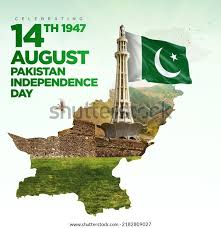Pakistan Independence Day :14 August
Pakistan’s Independence Day, celebrated annually on August 14th, marks the creation of Pakistan as a sovereign nation in 1947 following the end of British rule in India. The roots of Pakistan’s independence lie in the broader context of the Indian independence movement, which sought to end nearly two centuries of British colonial rule. The struggle for independence was marked by various movements and uprisings, but the concept of a separate nation for Muslims began to gain prominence in the early 20th century.
Table of Contents
The Two-Nation Theory
Pakistan Independence Day The idea of a separate Muslim state was primarily championed by the All India Muslim League, led by Muhammad Ali Jinnah. The Two-Nation Theory, which argued that Muslims and Hindus were distinct nations with different cultures, religions, and social structures, became the cornerstone of the demand for Pakistan. The Lahore Resolution of 1940, also known as the Pakistan Resolution, was a pivotal moment in this regard, as it formally articulated the demand for independent states for Muslims.

The Road to Independence
Pakistan Independence Day The period between the Lahore Resolution and independence was marked by intense political negotiations, communal strife, and mass mobilization. The Indian National Congress, the Muslim League, and the British government were the key players in these negotiations. World War II and the subsequent weakening of British imperial power accelerated the push for independence.
In 1946, the Cabinet Mission Plan proposed a loose federation of India, but it failed to address the Muslim League’s demand for a separate state. The failure of the plan led to widespread communal riots and violence. The situation deteriorated to such an extent that the British government decided to expedite the process of partitioning India.
The Partition of India
On June 3, 1947, the British government announced the partition plan, which was accepted by the Congress and the Muslim League. The plan, executed by the last Viceroy of India, Lord Louis Mountbatten, involved dividing British India into two independent dominions – India and Pakistan. Pakistan was to be created as a homeland for Muslims, consisting of two geographically and culturally distinct regions – West Pakistan (present-day Pakistan) and East Pakistan (present-day Bangladesh).
The partition plan led to one of the largest and most tragic migrations in history. Millions of Muslims, Hindus, and Sikhs moved across the newly drawn borders to their respective countries. The migration was marred by communal violence, massacres, and immense suffering, leaving a deep and lasting scar on the subcontinent’s history.
August 14, 1947: The Birth of Pakistan
Pakistan Independence Day On August 14, 1947, Pakistan was officially declared an independent nation. Muhammad Ali Jinnah, the leader of the Muslim League, became the country’s first Governor-General, and Liaquat Ali Khan was appointed the first Prime Minister. The new nation faced immediate challenges, including the integration of princely states, the rehabilitation of refugees, and establishing a functional government.
Celebrations and Traditions
Independence Day in Pakistan is a national holiday celebrated with great enthusiasm and patriotism. The day begins with special prayers for the country’s prosperity and unity. The main event is the flag-hoisting ceremony at the Presidential and Parliament buildings in Islamabad, attended by the President, Prime Minister, and other dignitaries. Similar ceremonies are held at provincial and district levels across the country.
Pakistan Independence Day The national flag, designed by Amiruddin Kidwai, symbolizes the country’s Islamic heritage and its commitment to minority rights. The flag has a green field with a white crescent moon and a five-pointed star in the center, and a vertical white stripe at the hoist side representing religious minorities.
Cultural events, parades, and fireworks are organized in major cities, and buildings and streets are adorned with lights and decorations. Educational institutions, organizations, and communities hold special programs, including speeches, debates, and performances highlighting Pakistan’s history, culture, and achievements.
Reflections on Independence
Pakistan Independence Day is a time for Pakistanis to reflect on their country’s journey, achievements, and challenges. It serves as a reminder of the sacrifices made by countless individuals who fought for freedom and envisioned a prosperous and inclusive Pakistan. However, it is also a moment to acknowledge the ongoing struggles and work towards addressing the issues that the nation faces.
Challenges and Aspirations
Pakistan Independence Day Since its inception, Pakistan has faced numerous challenges, including political instability, economic difficulties, and social issues. The early years saw the country grappling with the aftermath of partition, including the integration of refugees and managing its relations with India. The subsequent decades witnessed military coups, wars, and political turmoil.
Economic development has been a persistent challenge, with periods of growth often followed by setbacks. Pakistan’s economy relies heavily on agriculture, textiles, and remittances from overseas workers. Efforts to diversify the economy and attract foreign investment continue, alongside addressing issues such as poverty, education, and healthcare.
Socially, Pakistan has made strides in various areas, but it still faces challenges related to gender equality, religious tolerance, and human rights. Education and healthcare systems require significant improvements to meet the needs of a growing population.

Vision for the Future
The country’s strategic location, rich cultural heritage, and youthful population offer opportunities for growth and development. The vision for Pakistan’s future includes strengthening democratic institutions, fostering economic stability, and promoting social justice.
The aspirations of Pakistanis for their nation are encapsulated in the ideals of unity, faith, and discipline – the guiding principles articulated by Muhammad Ali Jinnah. These ideals continue to inspire efforts towards building a prosperous, inclusive, and peaceful Pakistan.
https://indianfastearning.com/
Conclusion
Pakistan’s Independence Day is a celebration of the nation’s birth, a tribute to the struggles and sacrifices of its people, and a reflection on its journey. It is a day to honor the past, acknowledge the present, and envision a future of hope and progress. As Pakistanis come together to celebrate this significant day, they renew their commitment to the ideals of freedom, justice, and equality, striving to build a nation that lives up to the dreams of its founders.







